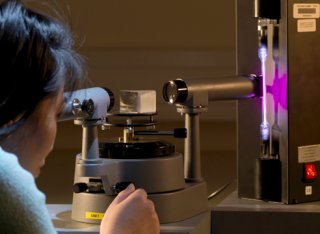
Medical modelling, artificial intelligence and analytics
Medical modelling, artificial intelligence (AI) and analytics research at the University of Surrey spans from retinal examinations to predicting diabetes, electrocardiogram analytics to predicting sepsis, analytics on human movement and many others.
Research in this area
Related research groups
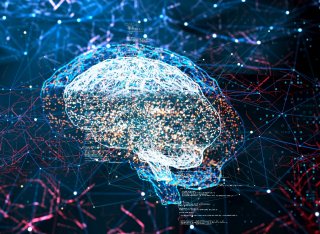
Artificial intelligence
Expertise in advancing AI algorithms to address practical, real-world applications and the potential impact across a range of domains for the benefit of society.
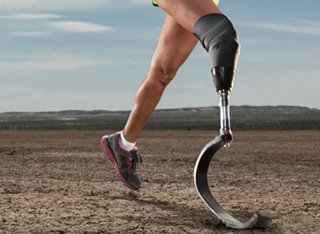
Centre for Biomedical Engineering
Researching the application of engineering and technology to problems in medicine and biology.

Centre for Mathematical and Computational Biology
Developing mathematical and computational methods to advance research and practical applications in life sciences and medicine.
Researchers

Dr Daniel Abasolo
Head of Centre for Biomedical Engineering, Senior Lecturer in Biomedical Engineering
About my research
Areas of specialism: Biomedical signal processing and machine learning for characterisation of healthy ageing, epilepsy and related disorders; early diagnosis of dementia, in particular Alzheimer's disease
Medical and health indications and disease stages: Alzheimer's disease and other forms of dementia, epilepsy and related disorders, ageing, and diabetes; diagnosis and, potentially, prevention/treatment when early diagnosis is successful.
Associated research centres and groups: Centre for Biomedical Engineering.
Research funding and collaborators: St. George's Hospital, University of Warwick, University of Strathclyde, University of Edinburgh, Universitat Politecnica de Catalunya, Universidad Politecnica de Madrid, Khalifa University.

Professor Philip Aston
Professor of Mathematics
About my research
Areas of specialism: Attractor reconstruction methods for analysing physiological data
Medical and health indications and disease stages: Detection of cardiovascular conditions, early diagnosis of cardiovascular deterioration, diagnosis, monitoring disease progression.
Associated research centres and groups: School of Veterinary Medicine, Centre for Mathematical and Computational Biology, Department of Mathematics.
Research funding and collaborators: EPSRC and Impact Acceleration.

Professor Melanie Bailey
EPSRC and Professorial Research Fellow Director BBSRC SEISMIC facility
About my research
Areas of specialism: Therapeutic drug monitoring and testing for illicit drugs, antipsychotic and antibiotic medications from a single fingerprint, multiomics analysis of sebum, saliva and blood serum for Covid-19 treatment stratification, high resolution elemental mapping and molecular imaging of tissues and cells.
Medical and health indications and disease stages: Treatment and multiple health indications especially brain and behaviour.
Associated research centres and groups: Surrey Ion Beam Centre and School of Chemistry and Chemical Engineering.
Research funding and collaborators: EPSRC, Intelligent Fingerprinting Limited, University of Groningen, University of Leicester, University of Manchester, Frimley Health NHS Foundation Trust, Surrey and Borders NHS Foundation Trust, GSK, AstraZeneca, NPL, University of North Texas and Rutgers University New Jersey.

Professor Liqun Chen
Professor in Secure Systems
About my research
Areas of specialism: Future proofing the connected world: A quantum-resistant trusted platform module (FutureTPM).
Medical and health indications and disease stages: Analysing contact tracing technology to help reduce Covid-19 spreading: Help trace potential Covid-19 patients.
Associated research centres and groups: Surrey Centre for Cyber Security, mobile phone research groups.
Research funding and collaborators: EU.

Professor Tao Chen
Associate Vice-President, International and Professor in Chemical Engineering
About my research
Areas of specialism: Mathematical modelling of dermal absorption kinetics and bioavailability, modelling response to radiotherapy and modelling food systems.
Medical and health indications and disease stages: Dermatology, topical drug development, cancer, nutrition for diagnosis, treatment.
Associated research centres and groups: Digital Processes Research Centre, Centre for Mathematical and Computational Biology.
Research funding and collaborators: EPSRC, BBSRC, NC3Rs, RAEng, US Food and Drug Administration, European Crop Protection Association, Cosmetics Europe, Unilever, National Physical Laboratory, Royal Surrey County Hospital, King’s College London, Institute of Process Engineering Chinese Academy of Sciences.

Dr Srdjan Cirovic
Lecturer in Biomedical Engineering
About my research
Areas of specialism: Analytical and computer modelling of cerebrospinal fluid dynamics, shock wave therapy for musculoskeletal disorders, prosthetics, acceleration and impact trauma, movement analysis.
Medical and health indications and disease stages: Cerebrospinal fluid system, musculoskeletal system: Prevention, treatment, and recovery.
Associated research centres and groups: Centre for Biomedical Engineering, School of Veterinary Medicine, High Performance Computing (Eureca Cluster), Human Movement Laboratory (movement analysis).
Research funding and collaborators: EPSRC, European Commission, Transportation Research Laboratory, Royal Surrey Hospital, Fitzpatrick Referrals.

Dr Carina Dunlop
Visiting Senior Lecturer
About my research
Areas of specialism: Mathematical modelling of biological systems. Computational approaches to developmental biology, tissue morphogenesis and cancer modelling. Modelling of tissue self-organisation and mechanical regulation of growth and cellular activity. PKPD modelling of cancer treatments.
Medical and health indications and disease stages: Cell biology.
Associated research centres and groups: Centre for Mathematical and Computational Biology.
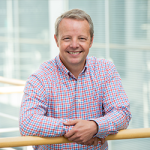
Professor Adrian Hilton
Director Surrey Institute for People-Centred AI | Director of Centre for Vision, Speech and Signal Processing
About my research
Areas of specialism: Machine learning and perception of people for healthcare.
Medical and health indications and disease stages: Non-contact measurement of human motion and behaviour for healthcare at home, human movement analysis for sleep, healthcare technologies for prevention, monitoring and diagnosis.
Associated research centres and groups: Centre for Vision Speech and Signal Processing and AI@Surrey network supporting AI/machine learning in healthcare.
Facilities: Specialised facilities for non-contact measurement and modelling of people from multiple view video.
Research funding and collaborators: Dementia Research Institute - Care Technology Research Centre, EPSRC Audio-Visual Machine Perception platform grant.

Dr Oleksiy Klymenko
Senior Lecturer in Chemical Process Engineering
About my research
Areas of specialism: Advanced optimisation and control of biologics production, modelling the transmission dynamics and persistence of infections in hospital settings, mathematical modelling, uncertainty and sensitivity analyses, optimisation.
Medical and health indications and disease stages: Immunology, antimicrobial resistance. Prevention and treatment.
Associated research centres and groups: Synthetic Biology Hub at Imperial College London, Bioprocess and Biochemical Engineering group (BioProChem).

Professor Paul Krause
Emeritus Professor
About my research
Areas of specialism: Explainable models for patient diagnosis, information theoretic approaches to medical decision making, semantic interoperability of health data.
Medical and health indications and disease stages: Health and environment, microbial communities and immune systems. Primary care.
Associated research centres and groups: Centre for Mathematical and Computational Biology.
Research funding and collaborators: City of London Corporation; AT Medics; BMJ; IET.

Professor Prashant Kumar
Co-Director, Institute for Sustainability, Professor and Chair in Air Quality and Health; Founding Director, Global Centre for Clean Air Research (GCARE)
About my research
Areas of specialism: Air quality and asthma, air pollution and green infrastructure implementation for reduced exposure, airborne particles exposure modelling, emissions, aerosols/bioaerosols and health.
Medical and health indications and disease stages: Epidemiology, respirology, airborne transmission of Covid-19, facemasks efficacy. Prevention and diagnosis.
Associated research centres and groups: Global Centre for Clean Air Research (GCARE).
Research funding and collaborators: UKRI (EPSRC, ESRC, NERC), Innovate UK, Horizon2020, QNRF, British Council, Industry. See all projects.
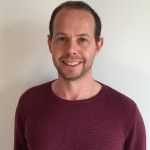
Professor David Lloyd
Professor in Mathematics
About my research
Areas of specialism: Mathematical modelling of Covid-19 using GP data, tracking, forecasting, mathematical modelling of stochastic dynamic networks.
Medical and health indications and disease stages: Epidemiology, immunology, Covid prevention.
Associated research centres and groups: Centre for Mathematical and Computational Biology, Centre for Criminology, Royal College of GPs, Research and Surveillance Centre, National Physical Laboratory.
Research funding and collaborators: IAA, EPSRC.

Dr Matthew Oldfield
Senior Lecturer in Mechanical Engineering
About my research
Areas of specialism: Medical applications of robotic technology, steerable needles for neurosurgery.
Medical and health indications and disease stages: Neurosurgery, shoulder disfunction, pelvic floor performance and incontinence. Diagnosis and treatment.
Associated research centres and groups: Centre for Biomedical Engineering, Human Movement Laboratory, Centre for Doctoral Training in Micro- and Nanomaterials and Technologies (MiNMaT).
Research funding and collaborators: Collaborations with Dr Aliah Shaheen - Sport Science and Exercise (Brunel University), Professor Ferdinando Rodriguez y Baena - Mechatronics in Medicine Laboratory (Imperial College London) and Physiotherapy Department at the Royal Surrey County Hospital.
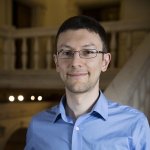
Dr Marco Sacchi
Associate Professor and Royal Society University Research Fellow in Physical and Computational Chemistry, Theme Leader in Sustainable Energy and Materials Research
About my research
Areas of specialism: Modelling of quantum effects in DNA mutations and repair mechanisms, quantum biology CDT with research directly relevant to fundamental understanding of health-related phenomena (DNA mutation, photoactivated DNA repair, dynamics of dehydrogenase).
Medical and health indications and disease stages: Immunology and antimicrobial resistance, computational approaches to DNA mutations with application to cancer research, fundamental understanding of life phenomena, improving treatments (for example prosthetics, implants) by designing and optimising new materials.
Associated research centres and groups: Health and Food research group, Leverhulme Centre for Quantum Biology.
Research funding and collaborators: Leverhulme, Tier 1 and Tier 2 national high performance computing (HPC) facilities and to local clusters (Eureka), Neutron and Helium- Scattering experimental groups and facilities (Cambridge, Graz, ILL).

Dr Michael Short
Associate Professor of Process Systems Engineering
About my research
Areas of specialism: Modelling of kinetic pathways in pharmaceutical chemical manufacturing and control, kinetic parameter estimation from spectra, API uncertainties, quality by design, continuous processing for pharmaceutical manufacturing.
Medical and health indications and disease stages: Cancer treatment.
Associated research centres and groups: Digital Processes Research Centre, Biegler Group at Carnegie Mellon University, Eli Lilly Small Molecule Design and Development Laboratory, Department of Nutritional Sciences at Surrey.
Facilities: Raman Spectrometer, UV-Vis Spectrometer, NIR/IR Spectrometers, continuous manufacturing technologies.
Associated colleagues: Dr Tao Chen, Dr Barbara Fielding.
Research funding and collaborators: BBSRC, China Agricultural University, Nanjing Tech University.
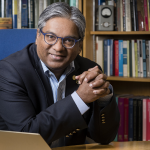
Professor Ravi Silva
Distinguished Professor, Interim Director - Institute for Sustainability (IfS), Director - Advanced Technology Institute (ATI) and Head of NanoElectronics Centre
About my research
Areas of specialism: Large area X-ray detectors for portable, flexible imaging, biosensors for autonomous sensing, 'internet of things' and wearables (incl. non-invasive), nano-biotechnology for cancer theranostics, MEAs for EEG, ECG and EMG probing.
Medical and health indications and disease stages: Assisted living, ageing, cancer, dementia, Alzheimer's, well-being and healthcare monitoring. Prevention, diagnosis, treatment or recovery.
Associated research centres and groups: Advanced Technology Institute and NanoElectronics Centre.
Facilities: Microbiology, nano-biotechnology, medical imaging, X-ray, proton beam.
Research funding and collaborators: EPSRC, UKRI, Innovate UK, NHS, NIHR, EU. NIBEC (Ulster), Dalian University of Technology, UCL, RSCH, Edinburgh University, NPL, SilverRay, Cheyney Design.

Professor Anne Skeldon
Professor of Mathematics
About my research
Areas of specialism: Mathematical modelling of sleep and circadian rhythms.
Medical and health indications and disease stages: Sleep, (role of light in), dementia, schizophrenia, cancer. Prevention and diagnosis.
Associated research centres and groups: Centre of Mathematical and Computational Biology, Mathematics of Life and Social Sciences Group, Surrey Sleep Research Centre, School of Psychology.
Research funding and collaborators: EPSRC, MRC.

Professor H Lilian Tang
Professor in Artificial Intelligence
About my research
Areas of specialism: Development of an automated system to separate normal and abnormal cases of digital retinal images, investigation of stochastic variations in growth rates a mechanism of drug tolerance in mycobacterium tuberculosis.
Medical and health indications and disease stages: Diabetes and tuberculosis.
Research funding and collaborators: BBSRC, EPSRC.

Professor Kevin Wells
Professor of AI in Human and Veterinary Healthcare
About my research
Areas of specialism: Diagnostic imaging, AI and computer vision for healthcare, digital pathology, PET/CT, mammography, non contact sleep monitoring, virtual clinical trials, veterinary imaging and veterinary healthcare, one health.
Medical and health indications and disease stages: Cancer, dementia, sleep, neuromorphology and gestalt, prevention, diagnosis, treatment or recovery.
Associated research centres and groups: Surrey Foundation Trust Hospital, NCCPM, Imperial-Surrey Dementia Research Institute, Fitzpatrick Referrals, School of Veterinary Medicine, FROST, National Physical Laboratory, Surrey Sleep Research Centre, vHive.

Other research areas

Research at Surrey
Research here at the University of Surrey seeks to answer global challenges, drive innovation and deliver real-world impact. We are working in various areas of research including lifelong health, sustainability and artificial intelligence.








